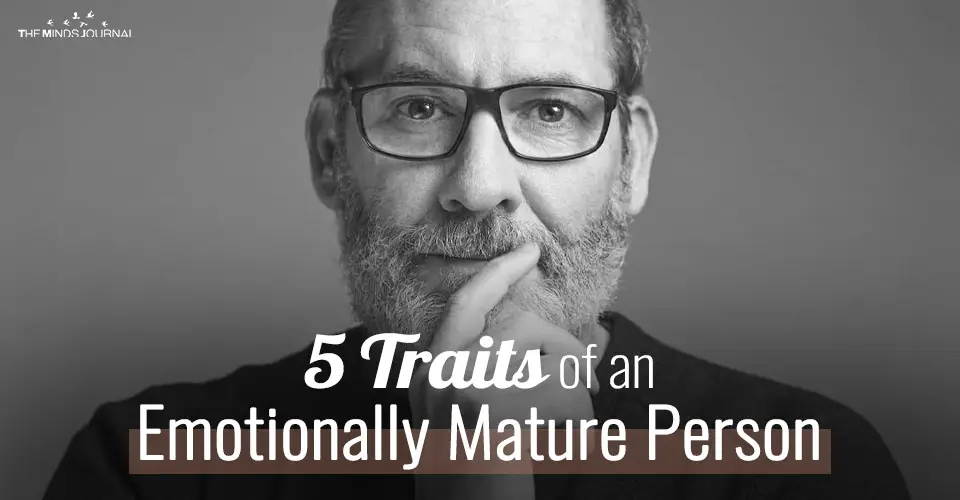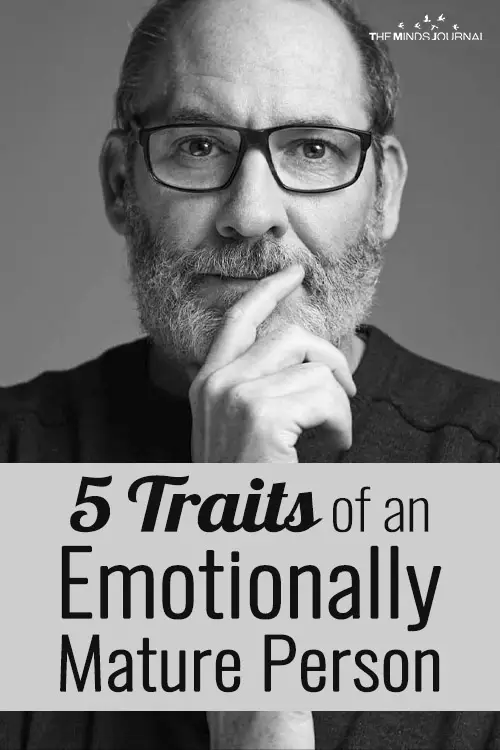I have lived a great deal among grown-ups. I have seen them intimately, close at hand. And that hasn’t much improved my opinion of them.” ~ Antoine de Saint-Exupéry
Emotional maturity is a difficult thing to measure. We can’t quantify it, or even describe exactly what it is. But we know it when we see it.
Many would say a person’s emotional maturity lies in their reactions to adversity and pain. Yet success and pleasure also serve to reveal a person’s ability to cope with their own emotions. We can observe how some rich people are charitable and helpful, while others are covetous and greedy.
Similarly, we see how some poor people are optimistic and hard-working, while others are self-defeating and without hope. People’s responses to circumstances vary greatly, just as emotional maturity varies.
Five Traits of an emotionally mature person.
1) Ability to Love
Opening ourselves up to love, whether it be romantic, platonic, or familial, is an act of bravery. Making oneself vulnerable to both rejection and reciprocation is a sure sign of maturity. Young children can love without maturity because they have yet to be hurt or rejected. Hence why teenagers often close themselves to love — out of fear of loss or rejection. Once most people reach a mature age, they will have been hurt countless times.
Only an emotionally mature adult will be able to accept these rejections and pains as realities and continue to open up and invite in intimacy and love to their lives. Most people are not so mature, and thus become jaded and cynical. They see love and intimacy of all kinds as childish and naive. But I would argue that closing oneself to love is the childish action. It’s the easy way out. It requires no bravery, no vulnerability, and no emotional maturity.
2) Willingness to Set Boundaries
It’s not easy to set boundaries. To do so we must speak out in times where it’s more comfortable to stick to the status quo. Life often presents situations where we can either let our integrity be eroded, or assert our own standards and boundaries. Choosing to set boundaries may lose us friends, or affection, but it will grant us immense self-respect. It prevents problems from developing into something much more damaging down the line.
But emotionally immature people aren’t comfortable setting boundaries. Rather than nipping interpersonal problems in the bud, they let them develop into full-on disasters and heart-breaks. They often get sucked into cycles of abuse or mistreatment. You’ll be able to spot an emotionally mature person by the quality and integrity of their relationships. There will be little if any unspoken tension or aggression. All that needs to be said, will be said. Even if it costs the relationship. An emotionally mature person operates under the belief that if a relationship violates their personal integrity, it’s not worth having.
3) Open-Mindedness
In modern times, nearly everyone claims to be open-minded. It’s become an attractive label and a compliment. But it’s a trait few people actually possess. Because real open-mindedness comes down to one thing: the willingness to accept that you’re wrong. Many who claim to have an open mind really only have open ears. They’re happy to listen to new and challenging ideas and viewpoints, but they internally reject all of them. They have barriers inside that stop new perspectives from actually effecting their notions about the world. These people will smile and nod as you share with them or challenge them, but their eyes will be blank and emotionally unresponsive.
Related: Psychological Study Reveals That Open Minded People Live In A Completely Different Reality
Emotionally mature people know themselves and their own values well enough to allow new ideas in, without accepting or rejecting them blindly. They are masters of their own minds. Challenging ideas are invited in, but many are promptly escorted out. Only the select few are incorporated as new belief systems.
4) Diverse Taste
Emotionally mature people don’t feel the need to label things as “high brow” or “low brow”. They are able to accept and enjoy art from both the ancient masters and amateur peers. This does not mean they don’t differentiate the good from the bad. They simply don’t allow things like the identity of the artist, the medium, the genre, or the time of creation to make this distinction for them.
This sort of person will love classical as well as Hip hop, and burgers along with caviar. An emotionally mature person doesn’t base their identity off the things they consume and admire. They choose the things they consume based on their indignity. This requires conscious self-awareness and acceptance. Most people are too reactive and emotionally unstable to actually know their value system, and thus choose an aesthetic and reject everything that isn’t an obvious fit.
5) Tenacious Curiosity
An emotionally mature person isn’t concerned with the opinions of negative people. Thus they constantly ask questions, without concern for looking stupid, or appearing ignorant. They seek to learn and reject any person or influence that would hinder them in that goal. They aren’t afraid of learning things that shake up pre-existing beliefs. In fact, they enjoy that feeling. New information isn’t a threat, it’s a promise of enlightening epiphanies. Because they know who they are, but also know they’re never a complete and perfect whole. Expansion and progression excite them. Stagnation is the only fear that controls their actions. Because being the master of one’s emotions means wanting to grow.
Do you know of any more traits of an emotionally mature person? Share with us in the comments.












Leave a Reply